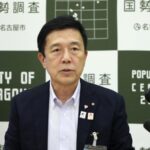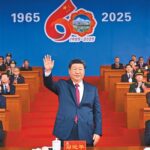On August 15, the Premier of the State Council attended the opening ceremony of the 2025 National Ecology Day主场 event and a symposium on the concept that “lucid waters and lush mountains are invaluable assets.” He emphasized the need to uphold the guidance of Xi Jinping Thought on Socialism with Chinese Characteristics for a New Era, thoroughly implement Xi Jinping’s Ecological Civilization Thought, and firmly practice the concept that lucid waters and lush mountains are invaluable assets. Greater efforts must be made to build even more beautiful landscapes and expand the economic benefits of green development, striving to write a new chapter in ecological civilization for the new era.
The Premier noted that since the concept of “lucid waters and lush mountains are invaluable assets” was introduced 20 years ago, its theoretical depth and practical application have continuously deepened, becoming a consensus and guiding principle for the entire Party and society. This important concept has enriched Marxist theories on the relationship between humans and nature as well as productivity, inherited and developed China’s excellent traditional ecological culture, and closely aligned with the characteristics and demands of the new development stage, providing scientific guidance for harmonious coexistence between humans and nature. This concept has led to historic, transformative, and comprehensive changes in China’s ecological civilization, achieving remarkable ecological and green development miracles. Our skies are bluer, lands greener, waters clearer, and the ecological environment more beautiful, while the “green” content in economic growth continues to rise. This concept has also provided China’s ideas, solutions, and contributions to global sustainable development and ecological civilization.
The Premier pointed out that China’s economic and social development has entered a high-quality development stage characterized by accelerated greening and low-carbon transformation. It is essential to steadfastly follow the path of ecological priority and green development. Greater efforts must be made to build even more beautiful landscapes, persistently advance the battle against pollution, enhance ecosystem diversity, stability, and sustainability, and firmly safeguard national ecological security. Green development methods should be employed to expand economic benefits, continuously optimize the spatial planning for development and conservation, promote green and low-carbon industrial transformation, and accelerate the formation of an industrial structure with high technological content, low resource consumption, and minimal environmental pollution. Sound institutional frameworks must provide reliable safeguards for protecting lucid waters and lush mountains, innovating ecological civilization systems and mechanisms, implementing reform tasks, and strengthening rigid constraints and intrinsic incentives. Firm and practical measures should be taken to actively advance global ecological civilization, working with all parties to protect the environment, address climate change, and jointly promote global sustainable development.
The Premier stressed the need to uphold and strengthen the Party’s comprehensive leadership in ecological civilization, ensuring all regions and departments work together in a coordinated effort. Efforts should be made to disseminate and explain Xi Jinping’s Ecological Civilization Thought, further fostering a strong atmosphere of ecological awareness. The whole society must be mobilized to take active action, working together to build a beautiful China and contribute more to a clean and beautiful world.
Representatives from the National Development and Reform Commission, the Ministry of Natural Resources, the Ministry of Ecology and Environment, as well as officials from Beijing and Zhejiang Province, along with experts, scholars, and representatives from international organizations, spoke at the symposium.
2025 National Ecology Day主场
“2025 National Ecology Day主场” (2025 National Ecology Day Main Event) is a significant cultural and environmental event in China, aimed at promoting ecological awareness and sustainable practices. Hosted as part of China’s National Ecology Day (established in 2023), the 2025 edition will likely feature exhibitions, forums, and activities highlighting biodiversity, green development, and climate action. The event reflects China’s commitment to ecological civilization and aligns with global environmental goals.
Xi Jinping Thought on Socialism with Chinese Characteristics for a New Era
“Xi Jinping Thought on Socialism with Chinese Characteristics for a New Era” is a political ideology introduced by Chinese leader Xi Jinping in 2017, enshrined in China’s Constitution and the Communist Party’s charter. It outlines China’s development goals, emphasizing party leadership, national rejuvenation, and a modern socialist society. The ideology serves as a guiding framework for China’s policies, including economic reform, military strengthening, and global influence under Xi’s leadership.
Xi Jinping’s Ecological Civilization Thought
“Xi Jinping’s Ecological Civilization Thought” is a guiding philosophy in China that emphasizes sustainable development and environmental protection as key components of modernization. Introduced by President Xi Jinping, it reflects China’s commitment to balancing economic growth with ecological preservation, drawing from traditional Chinese values of harmony between humans and nature. The concept has shaped national policies, such as green energy initiatives and pollution control, aiming to build an “ecological civilization” for future generations.
National Development and Reform Commission
The National Development and Reform Commission (NDRC) is a macroeconomic management agency under China’s State Council, responsible for formulating and implementing economic and social development strategies. Established in 1952 as the State Planning Commission, it was reorganized in 2003 to focus on broader economic planning, reform, and industrial policy. The NDRC plays a key role in China’s five-year plans, infrastructure projects, and market regulation.
Ministry of Natural Resources
The **Ministry of Natural Resources** is a governmental body responsible for managing a nation’s natural resources, including land, water, minerals, and energy. Its history varies by country, but such ministries were often established in the 20th century to oversee sustainable resource use, environmental protection, and economic development. Today, many ministries also focus on combating climate change and promoting conservation policies.
Ministry of Ecology and Environment
The **Ministry of Ecology and Environment (MEE)** of China, established in 2018, is a government agency responsible for environmental protection, pollution control, and ecological conservation. It replaced the former Ministry of Environmental Protection (2008–2018) and plays a key role in implementing China’s environmental policies, including climate change initiatives and green development strategies. The MEE reflects China’s growing focus on balancing economic growth with sustainable environmental practices.
Beijing
Beijing, the capital of China, is a city with over 3,000 years of history, serving as the political and cultural heart of the country for much of the past millennium. It is renowned for its ancient landmarks, such as the Forbidden City (Imperial Palace for 24 emperors during the Ming and Qing dynasties) and the Great Wall, as well as modern structures like the Bird’s Nest Olympic Stadium. A blend of tradition and modernity, Beijing reflects China’s rich heritage and rapid development.
Zhejiang Province
Zhejiang Province, located on China’s southeastern coast, is renowned for its picturesque landscapes, rich history, and vibrant cultural heritage. It was a key center of ancient Yue culture and the Southern Song Dynasty (1127–1279), leaving behind historic sites like Hangzhou’s West Lake and the Grand Canal. Today, Zhejiang is a thriving economic hub, known for its tea production (e.g., Longjing tea), silk industry, and tech innovation.


